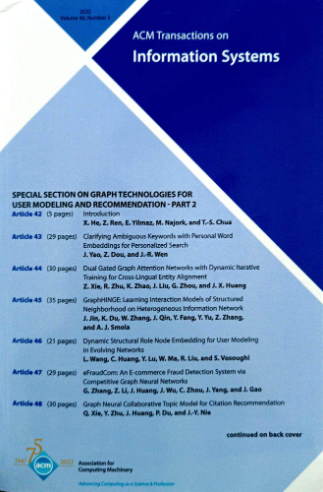FairGap:通过生成反事实图进行公平感知推荐
IF 5.4
2区 计算机科学
Q1 COMPUTER SCIENCE, INFORMATION SYSTEMS
引用次数: 0
摘要
图神经网络(GNN)的出现极大地推动了推荐系统的发展。最近,许多研究人员利用基于 GNN 的模型来学习用户和项目的公平表征。然而,目前基于 GNN 的模型存在用户与项目交互数据偏差的问题,这对推荐的公平性产生了负面影响。虽然已有一些研究采用对抗学习来缓解推荐系统中的这一问题,但它们大多侧重于通过公平正则化来修改模型训练方法,而忽视了对有偏差的交互的直接干预。与这些模型不同,本文引入了一个新的视角,即直接干预观察到的交互,生成一个不受敏感节点属性影响的反事实图(称为 FairGap),使我们能够轻松地学习用户和项目的公平表征。我们设计公平差距来回答关键的反事实问题:"如果用户的敏感属性被隐藏,与物品的交互会保持不变吗?".我们还提供了理论证明,表明我们通过反事实图的学习策略在预期上是无偏的。此外,我们还提出了一种公平性增强机制,以持续改善基于图的推荐中的用户公平性。在三个真实数据集上与最先进的竞争对手和基础模型进行的大量实验结果验证了我们提出的模型的有效性。本文章由计算机程序翻译,如有差异,请以英文原文为准。
FairGap: Fairness-aware Recommendation via Generating Counterfactual Graph
The emergence of Graph Neural Networks (GNNs) has greatly advanced the development of recommendation systems. Recently, many researchers have leveraged GNN-based models to learn fair representations for users and items. However, current GNN-based models suffer from biased user-item interaction data, which negatively impacts recommendation fairness. Although there have been several studies employed adversarial learning to mitigate this issue in recommendation systems, they mostly focus on modifying the model training approach with fairness regularization and neglect direct intervention of biased interaction. Different from these models, this paper introduces a novel perspective by directly intervening in observed interactions to generate a counterfactual graph (called FairGap) that is not influenced by sensitive node attributes, enabling us to learn fair representations for users and items easily. We design the FairGap to answer the key counterfactual question: “ Would interactions with an item remain unchanged if user’s sensitive attributes were concealed? ”. We also provide theoretical proofs to show that our learning strategy via the counterfactual graph is unbiased in expectation. Moreover, we propose a fairness-enhancing mechanism to continuously improve user fairness in the graph-based recommendation. Extensive experimental results against state-of-the-art competitors and base models on three real-world datasets validate the effectiveness of our proposed model.
求助全文
通过发布文献求助,成功后即可免费获取论文全文。
去求助
来源期刊

ACM Transactions on Information Systems
工程技术-计算机:信息系统
CiteScore
9.40
自引率
14.30%
发文量
165
审稿时长
>12 weeks
期刊介绍:
The ACM Transactions on Information Systems (TOIS) publishes papers on information retrieval (such as search engines, recommender systems) that contain:
new principled information retrieval models or algorithms with sound empirical validation;
observational, experimental and/or theoretical studies yielding new insights into information retrieval or information seeking;
accounts of applications of existing information retrieval techniques that shed light on the strengths and weaknesses of the techniques;
formalization of new information retrieval or information seeking tasks and of methods for evaluating the performance on those tasks;
development of content (text, image, speech, video, etc) analysis methods to support information retrieval and information seeking;
development of computational models of user information preferences and interaction behaviors;
creation and analysis of evaluation methodologies for information retrieval and information seeking; or
surveys of existing work that propose a significant synthesis.
The information retrieval scope of ACM Transactions on Information Systems (TOIS) appeals to industry practitioners for its wealth of creative ideas, and to academic researchers for its descriptions of their colleagues'' work.
 求助内容:
求助内容: 应助结果提醒方式:
应助结果提醒方式:


